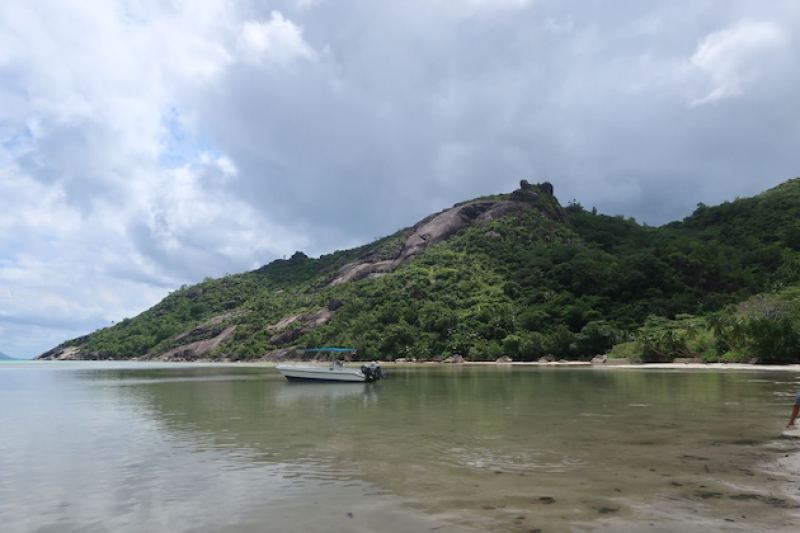- Nation Votes Tomorrow in 13th Poll, Referendum |
- Key in your hands, use it wisely: Prof Yunus tells voters |
- Yunus Urges Voters to Shape a ‘New Bangladesh’ |
- Bangladesh Polls: Campaign Ends as Voters Weigh Pledges |
- Bangladesh Heads to First Gen Z-Driven Competitive Poll |
Ocean Health: Saving the Ocean – Act Now!

It is time to shine a spotlight on small island nations in different parts of the world, argues James Alix Michel, former President of the Republic of Seychelles.
It is time to shine a spotlight on small island nations in different parts of the world, argues James Alix Michel, former President of the Republic of Seychelles.
Like so many problems besetting the world, the existential threats facing small island states are all too obvious. Island nations are surrounded by the sea, and they depend on it for their livelihood and for their security. The sheer power of the sea can never be tamed, but islanders have learnt to work with it, and in doing so, there has always been a productive balance. But this balance has now been cast aside – the relationship has broken down. Our mighty ocean is in poor shape.
The ocean has been wilfully exploited by the world in the name of ‘progress’. And it is now hitting back. We are all too familiar with related issues of rising sea levels, overfishing, the polluting effects of shipping, seabed mining, acidification, and the destruction of marine ecosystems. And the list goes on. The question now is: what can be done about it? Or is it too late?
The world’s superpowers are more preoccupied with their own competition for primacy, middle-ranking powers are scrambling to catch up with those above them, and small island states, who are not blameless, show all too many examples of harmful development.
Sadly, we are running out of options. Various international institutions responsible for driving solutions have become overly bureaucratic and subject to partisan interests, which in turn slows down progress in conservation and sustainability efforts. The United Nations—once everyone’s hope in averting international crises—is in many ways failing to deliver. There is no magic wand to be waved in that forum. But some people do care, especially young people. If a top-down approach has not worked, can we now do more to activate change from the bottom up? This is probably our best hope of reversing the downward trend. So how would we do it?
Firstly, at the individual and community level, focus on promoting sustainable practices that reduce pollution, reduce carbon footprints, restore habitats, and increase ocean literacy. These grassroots actions will drive change from the ground up, opening doors to influence policy.
Secondly, grow local action. There are already some wonderful initiatives around the world. And they really do make a difference – protecting marine breeding grounds, restoring coral reefs, replanting mangrove and coastal coconut plantations, creating green coastal defences. But these are not enough. Multiply the number of projects not by measly single figures but by a hundred!
Thirdly, make our political systems more responsive. Leaders are too often elected with manifestos that are quickly forgotten. Let us not forget that leaders must prioritize the ocean because it is fundamental to human health, planetary stability, and economic prosperity. Ignoring ocean health would worsen, if not trigger, severe climate impacts leading to economic instability, making its protection a matter of human survival and sustainable development.
Next, use the media effectively to shine a spotlight on small island nations in different parts of the world. Show the state of the ocean now, but also show what is being done locally to stop the rot. Point out that tourists can themselves act as a force for change by supporting local economies, raising awareness of marine health, reducing their own impact, and directly participating in conservation actions. When done right, marine tourism can become one of the most powerful tools for ocean conservation and restoration.
Lastly, a high-profile competition in which all small island states present their own bottom-up plans. This would be not only a matter of status and prestige but also of material benefit in attracting further investment. It would soon become evident which are doing the most to save the ocean and which are not. Those in the latter category would then be encouraged to adopt some of the winning ways.
Notably, Sustainable Development Goal 14, which focuses on life below water, remains the least funded among all SDGs due to ocean health being seen as a less immediate or tangible priority compared to other issues, despite its critical role in supporting life on Earth. Yet, high-profile events such as the Monaco Ocean Protection Challenge and other high-profile initiatives are continuously encouraging creative expression from the youth and attracting political and industry leaders to support innovative and powerful solutions to save the ocean.
The fact is that it would be all too easy to throw in the towel. Things have deteriorated so much, but it is never too late to fight back. The stakes in this case are too high to dismiss. Saving the ocean should not be a mere slogan. We need to be able to see its manifestation in the sea. Act now!

